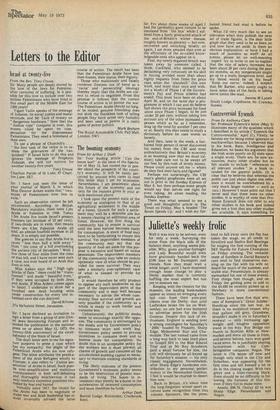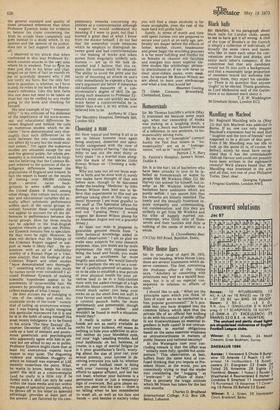Controversial Eysenck
From Dr Anthony Clare
Sir: Professor Eysenck's letter (May 5) illustrates many of the qualities which I described in by article (' Eysenck the Controversialist,' April 21). Firstly, he berates me for being either ignorant or machiavellian because I observed that in his book, Race, Intelligence and Education, he bases his argument that the Irish score poorly on IQ tests upon a single study. There are, he now announces, many other studies but he felt unable to include "references to all relevant studies" in a book intended for the general public. (It is clear that he believes that whereas the public can just about digest one reference it would be overwhelmed by a very much larger number — such as two.) However I must point out that I never said that there were no other studies. It is worthy of note that Professor Eysenck does not refer to any other studies in his book and indeed gives not a hint that any other studies are available. It says something for
the general standard and quality of these Unnamed references that when Professor Eysenck looks for evidence to bolster his claim concerning the Irish he avoids them completely and goes instead to a study which, in my opinion and the opinion of its author. does not in fact support his claim at all.
I observed in my article that when confronted in this way Professor Eysenck counter-attacks in the very area where he is weakest. True to frm he does just this in his letter and challenged on an item of fact he rounds on me to scornfully demand why / did not verify my facts. But the only fact here in question, is whether, as I have stated, he relies in his book on Macnamara's reference. Like the best facts this one does not need to be taken on trust but can be verified by any reader going to the book and checking for himself.
His next example of my" irresponsibility "is my criticism of his dismissal of the importance of the socio-economic and educational differences between England and Ireland. He calls up numerous studies which he declares " have demonstrated very thoroughly that such differences as do exist between the two countities do not affect IQ to any but the most minimal extent." Yet again the nurnerous studies are unnamed except for one and the general public, for whom presumably it is intended, would be forgiven for believing that the Coleman Report referred to the question of the intelligence differences between the populations of England and Ireland. In fact the report is based on the results of •testing over 600,000 children from • several racial backgrounds in some 4,000 schools in the United States. It found, among other things, that certain socio-economic and educational variables did actually affect scholastic performance within each of the racial groups involved; however these variables did not appear to account for all the differences in performance between the racial groups. How far these results can be applied to the Irish-English question remains an open one. Professor Eysenck remains free to speculate. He may even be right. However, he does not declare that the findings of the Coleman Report suggest or support or make it likely that . He announces, with an air of infallibility worthy of a Roman Pope or a Viennese analyst, that the findings of the Coleman Report and other studies " have demonstrated very thoroughly " something which the only study he names never even considered! I accused Professor Eysenck of making scientific hypotheses appear to be statements of inconvertible fact. He answers by providing me with an excellent example of what I mean.
He then accuses me of indulging in " one of the oldest and most discreditable tricks of the trade " namely that of calling up anonymous witnesses. I was hoping he might recognise this particular manoeuvre for it is one he is in the habit of using himself! His most recent indulgence is to be found in his article 'The New Zealots' (Encounter, December 1972) in which he calls up a host of eminent and anonymous geneticists and psychologists who apparently agree with him in private but are afraid to say so in public. Professor Eysenck might claim that at least his anonymous experts have reason to stay quiet. The disgusting violence and mindless thuggery to which he himself was exposed at LSE recently underlines the point. What, he wants to know, keeps his critics quiet? His skill as a controversialist (and he really is a little coy if he thinks such a skill can only be used within the mass media and not within the pages of specialist journals), which he shows off in his letter to splendid advantage, provides at least part of the answer. I am flattered by his com plimentary remarks concerning my abilities as a controversialist although I suspect he would understand my meaning if I were to point out that I learned a great deal of what I know from the master himself. I do not feel that the somewhat crude measures which he employs to distinguish between good and bad controversialists . — the making of bricks and silken purses from singularly unlikely substances — are up to the task demanded and I believe that this explains the curious result he obtained. The ability to avoid the point and the tactic of mounting an attack on one's critic immediately he exposes a flaw in one's argument are better if somewhat old-fashioned measures of a controversialist's degree of skill. On applying such measures to Professor Eysenck's letter one can quickly see how much better a controversialist he is, better than even I, in my article, ever believed him to be.
Anthony W. Clare The Maudsley Hospital, Denmark Hill, London SE5



































 Previous page
Previous page